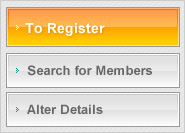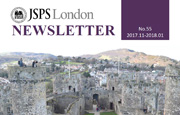JSPS Fellow's Experiences in Japan
Dr. Alexis Comber
I joined Prof. Hiroshi Suzuki and Dr Satoshi Sasaki of the Department of Infectious Disease Control and International Medicine, Graduate School of Medical and Dental Sciences, Niigata University for 2 months. I am an expert in spatial analysis techniques (GIS) with some experience in policy evaluation. My hosts work mainly in the area of public health.
During my collaboration with Dr Sasaki and Prof Suzuki, I developed and applied a genetic algorithm (GA) approach to optimise the location of health facilities. This was based on current emergency cases and cased predicted from future population changes. Such advanced spatial statistical techniques, although commonly used in other areas of informatics, have not been widely used in public health planning, despite being particularly well suited to public health planning problems. The GA analysis optimised location based on minimising travel times (and distances) weighted by current emergency cases and predicted ones derived from future population changes.
The results showed:
a } the benefits in response times - an average improvement of 1 minute 14 seconds - that could be gained by changing the location of a small number of ambulances (4 out of 27 in the Niigata city area). b) the optimal locations of ambulances in time intervals to 2050 based on predicted cases from future population changes. c) in both cases the benefits in terms of average response times of N ambulances, allowing planners to determine how many ambulances are needed as well as where they should be located. The method demonstrated the benefits of using advanced spatial techniques such as GA in domains that are inherently spatial such as public health planning.
Japan has an increasingly aging society and the elderly constitute a very high proportion of emergency cases. The demographic changes and associated problems being addressed in Japan now are those that will be faced in the future by other developed economies. Developing solutions to those problems and gaining an understanding of the public health planning context is therefore very relevant to my research. I have gained considerable experience in the domain of public health and now understand how more advanced spatial analysis techniques may be applied to many different public health problems to improve planning and policy evaluation. My hosts gained experience and training in the use of advanced spatial analytical techniques using the R statistical programming language project. Future work will model the impacts of a triage system of ambulances (i.e. reserving some health facilities for severe emergency cases).
As part of my fellowship I arranged to give a couple of presentations to other research groups in other universities. These in turn have resulted in the beginnings of further collaborations through the development of concept notes, joint case studies and informal collaboration agreements.
My advice to those wishing to work in a Japanese research environment is to be pro-active in your research:
Think about the proposed research before you leave, develop possible approaches and apply to test data before you leave (i.e. turn up with some tools). Think about the skills you have that they do not (and vice versa) and focus on those different roles in the research collaboration. What do you want your hosts to do as part of your research? After a few days of orientation, present your hosts with a research plan based on your evaluation of the problem or task in hand, break down that plan to discrete steps each with their own method development, analysis and results; let your hosts what data and analyses you will need from them for each stage; put a timescale on each stage, and most importantly identify publications that can be carved out. As each stage is completed, give them a short report, with the methods and results. Write and submit the papers - you will be a success if there are tangible and immediate outputs as a result of your visit. Do not be intimidated by the 8am-8pm work culture. Work how you need to. We are all used to specific research environments and I had no problem in leaving early (4 or 5pm) if I felt I was at an impasse. After the walk home, a bit of food and a beer, I would often solve the problem by having a play with the data or the analysis technique. Enjoy the sushi.
Learn the meaning of "nomi hodai".





